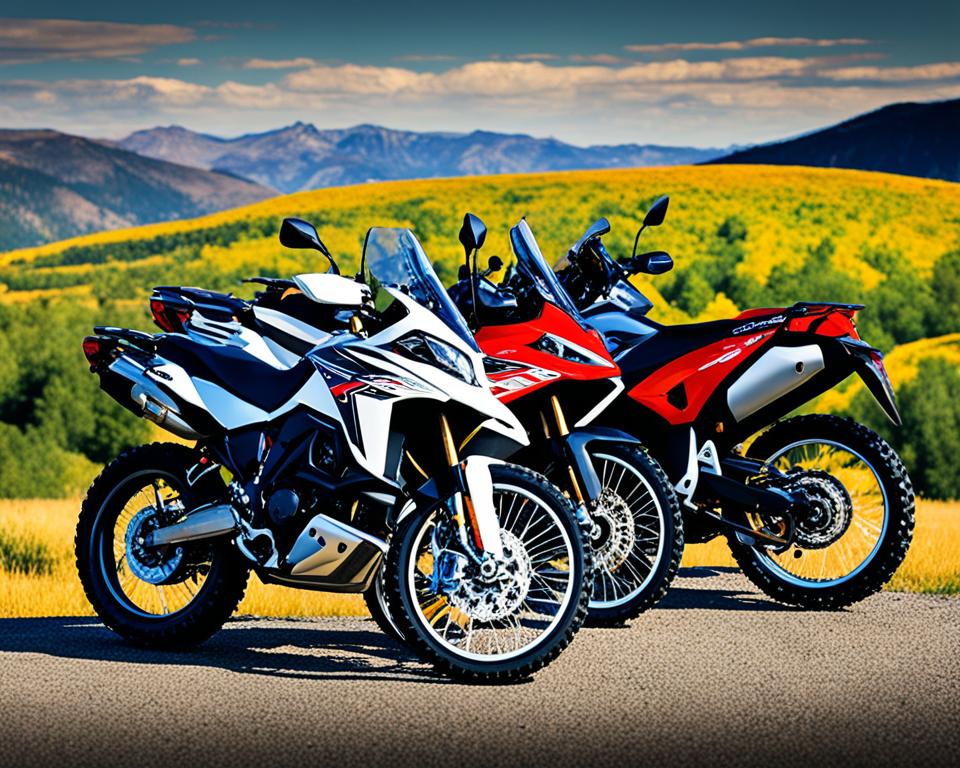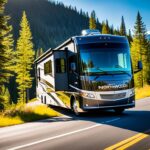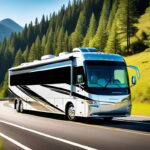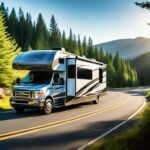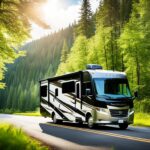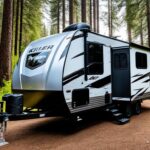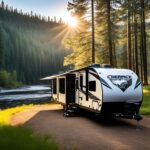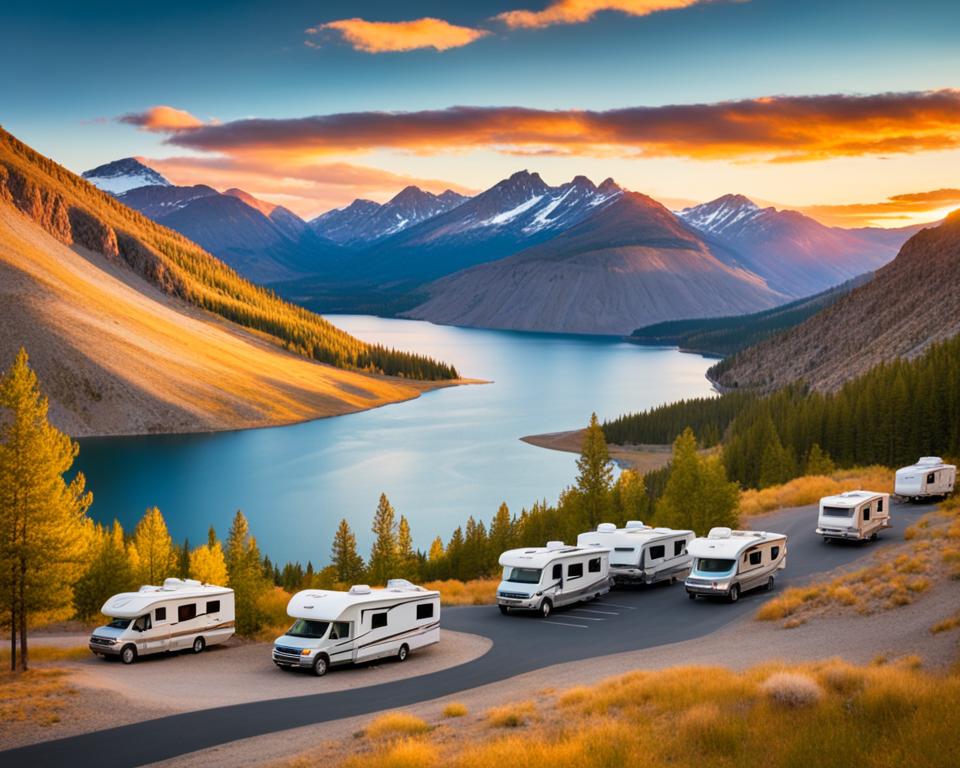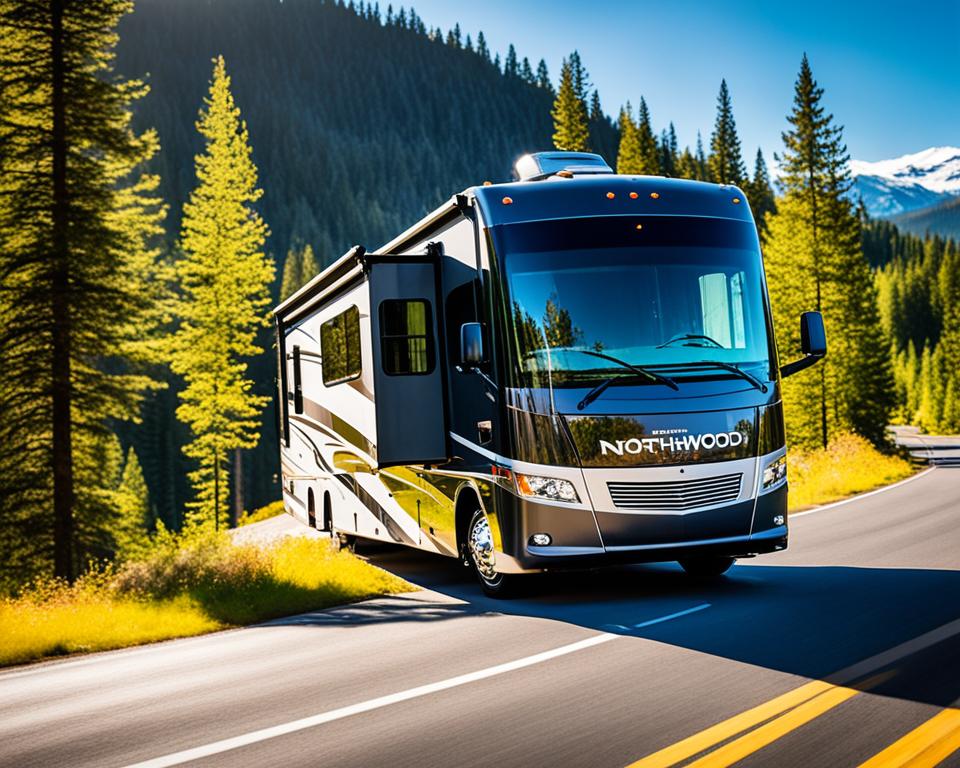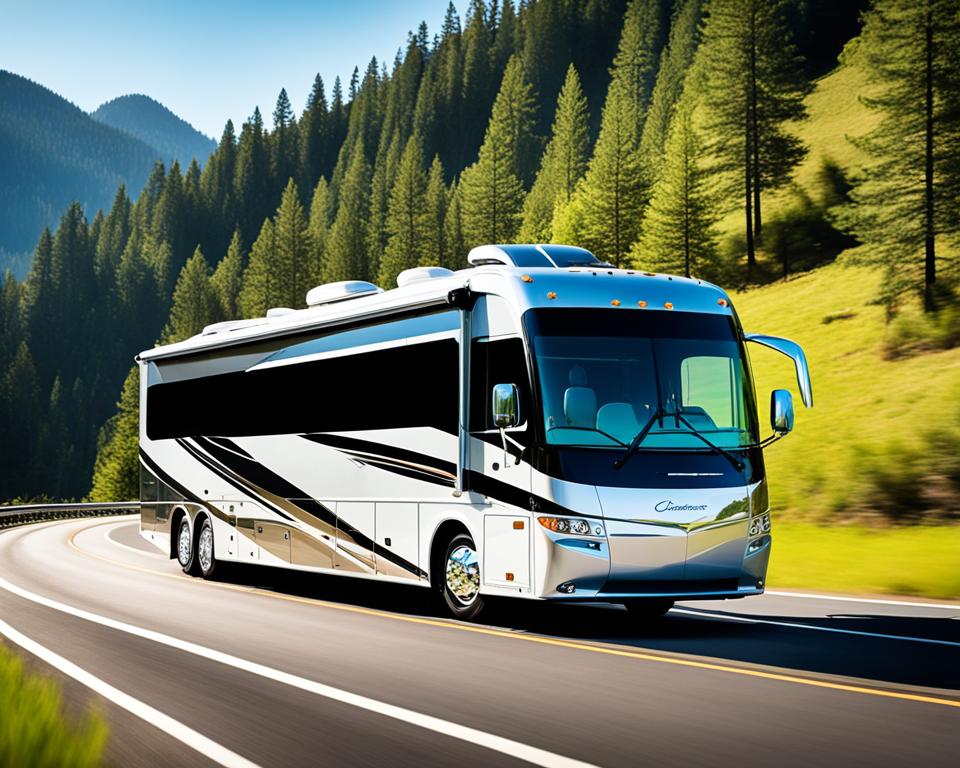When we think of recreational vehicles (RVs), images of fully-equipped campers and motorhomes often come to mind. But what about motorcycles? Are they considered recreational vehicles? Let’s take a closer look at the classification of motorcycles and how they differ from traditional RVs.
While motorcycles are often classified as RVs by insurance brokers, they are technically a different vehicle category altogether. By definition, RVs are means of transport used for camping and temporary accommodation. Motorcycles, on the other hand, are vehicles with two or three wheels and engines greater than 150 cubic cm in size.
Key Takeaways:
- Motorcycles are not considered traditional recreational vehicles.
- Insurance brokers may classify motorcycles as RVs.
- RVs are designed for camping and temporary accommodation.
- A motorcycle is a vehicle with two or three wheels and an engine greater than 150 cubic cm in size.
- Understanding the classification and purpose of motorcycles is important for insurance coverage and proper identification.
Types of Recreational Vehicles
Recreational vehicles (RVs) encompass a wide range of vehicles designed for temporary accommodation, travel, and recreational use. They can be classified into two main categories: motorized vehicles and towable vehicles.
Motorized Vehicles:
Motorized vehicles, also known as motorhomes, are self-propelled and offer the convenience of having both a living space and an engine. They come in different sizes and configurations to suit various needs and preferences.
- Class A Motorhomes: These are the largest and most luxurious motorhomes, resembling a bus. They provide ample living space, multiple slide-outs, and a range of amenities.
- Class B Motorhomes: Also known as camper vans, these compact and versatile vehicles combine the comfort of a motorhome with the maneuverability of a van.
- Class C Motorhomes: These motorhomes are built on a truck or van chassis and have an overhead bed, maximizing sleeping capacity without sacrificing space.
Towable Vehicles:
Towable vehicles, as the name suggests, are vehicles that require a separate towing vehicle. They offer the flexibility of disconnecting the living space from the engine, allowing individuals to use their primary vehicle for everyday transportation.
- Conventional Caravans: These are the traditional travel trailers, ranging from small and compact to large and luxurious, offering various amenities for a comfortable camping experience.
- Fifth Wheels: These are towable trailers that attach to a pickup truck using a fifth-wheel hitch. With a raised front section for added living space, they often provide more room than conventional caravans.
- Pop-Up Campers: Also known as tent trailers or folding campers, these lightweight trailers can be collapsed for easy towing and storage. Once at the destination, they can be expanded to provide a comfortable living space.
- Hybrid Trailers: These trailers combine the features of a traditional travel trailer with pop-up tent sections, offering the best of both worlds in terms of space and portability.
Whether you prefer the convenience of a motorized vehicle or the flexibility of a towable vehicle, there is an RV option to suit your lifestyle and travel aspirations. The choice ultimately depends on factors such as budget, desired amenities, size requirements, and personal preferences.
Storing Your RV
One important consideration when owning an RV is finding a suitable storage space when it’s not in use. For those who have a home, options may include keeping the RV in the garage or on the property. However, those living in apartments or areas with limited space may need to find alternative storage solutions such as a storage lot or borrowing space from a friend.
When deciding on RV storage, there are several factors to take into account:
1. Convenience
Choose a storage option that is convenient for you. If you have the space, storing your RV on your property provides easy access whenever you need it. On the other hand, if you live in an area with limited space, a storage lot or facility may be more suitable.
2. Security
Ensure the storage location provides adequate security measures to protect your RV from theft or vandalism. Look for facilities with gated access, surveillance systems, and secure fencing.
3. Amenities
If you opt for a storage lot or facility, consider the amenities they offer. Some facilities provide additional services such as electricity hookups, dump stations, and wash bays. These amenities can be convenient when preparing your RV for a trip or returning from one.
4. Size and Accessibility
Check the dimensions of the storage space to ensure it can accommodate your RV. Additionally, consider whether the location provides easy access for towing or maneuvering your RV into the storage area.
Remember to prepare your RV for storage properly. Clean the interior and exterior, remove perishable items, and perform any necessary maintenance to ensure it’s in good condition when you take it out of storage.
Here’s a comprehensive table comparing different RV storage options:
| Storage Option | Location | Convenience | Security | Amenities |
|---|---|---|---|---|
| Home Storage | On your property in a garage or driveway | High | Dependent on your security measures | Dependent on your facilities |
| Storage Lot | Off-site facility | Medium | Provided by the storage lot | Dependent on the storage lot |
| Borrowing Space | Friend or family member’s property | Dependent on availability | Dependent on the property’s security measures | Dependent on the property’s facilities |
Consider these factors and refer to the table when deciding on the best storage option for your RV. Storage is an essential aspect of RV ownership that ensures your vehicle remains protected and in good condition for future adventures.
Transporting Your RV
When it comes to transporting your RV, the method will depend on the type of vehicle you own. Some RVs, such as motorhomes and motorcycles, are designed for self-propulsion, making them easier to transport. However, if you have a towable RV like a boat, snowmobile, or camp trailer, you’ll need a truck or trailer to haul it to your desired location.
Transporting towable RVs requires the right equipment to ensure a safe and secure journey. It’s important to choose a truck or trailer that is capable of handling the weight and size of your RV. This will help prevent damage to both your RV and the transporting vehicle.
Before embarking on your journey, make sure to properly prepare your RV for transportation. This includes securing all loose items, checking the tires and brakes, and ensuring that the RV is properly hitched or attached to the transporting vehicle. Taking these precautions will help minimize the risk of accidents or damage during transit.
If you’re unsure about how to transport your RV safely, it’s recommended to consult with professionals who specialize in RV hauling. They have the expertise and experience to handle all types of RVs and can ensure that your vehicle arrives at its destination in the best possible condition.
Remember, transporting your RV is not only about getting it from point A to point B, but also about ensuring its safety and preserving its value. By taking the necessary precautions and seeking professional guidance when needed, you can enjoy worry-free travels with your cherished RV.
Key Points:
- The transportation method for your RV depends on its type (self-propelled or towable).
- Towable RVs require a truck or trailer for hauling.
- Choose a vehicle capable of handling the weight and size of your RV.
- Properly prepare your RV for transportation to ensure a safe journey.
- Consult with professionals for expert guidance on RV hauling if needed.
RV Maintenance
Keeping your recreational vehicle (RV) in top shape is essential for a smooth and enjoyable camping experience. Regular maintenance not only ensures the longevity and performance of your RV but also helps prevent costly repairs down the line. Whether you’re a do-it-yourself enthusiast or prefer to hire professionals, here are some essential tasks to keep your RV in optimal condition.
Oil Changes
Just like any other motorized vehicle, RVs require regular oil changes to keep the engine running smoothly. Consult your RV’s manual or your mechanic to determine the recommended oil change frequency and the appropriate oil type to use.
Tire Replacements and Inspections
Tires are a crucial component of RV safety, and regular inspections are vital for identifying any signs of wear or damage. Additionally, consider replacing your RV’s tires every five to seven years, regardless of tread depth, as the rubber can deteriorate over time.
General Upkeep
In addition to oil changes and tire maintenance, there are several other important tasks to include in your RV maintenance routine. These include:
- Checking and topping up fluid levels
- Inspecting and replacing filters (air, fuel, and water)
- Testing and maintaining the RV’s battery
- Cleaning and lubricating slide-outs, awnings, and other moving parts
- Inspecting and sealing any potential water leaks
Hiring Professionals vs. DIY
Deciding whether to hire professionals or perform RV maintenance tasks yourself depends on your comfort level, skills, and available time. While hiring professionals ensures expertise and saves you time, doing it yourself can be cost-effective and provides an opportunity to learn more about your RV’s mechanics.
“Regular maintenance is the key to ensuring your RV’s longevity and performance.” – John Anderson, RV enthusiast
Routine Maintenance Schedule
To stay on top of your RV’s upkeep, create a routine maintenance schedule that suits your needs. This schedule should include tasks such as oil changes, tire inspections, and general maintenance. Set reminders or use an RV maintenance app to help you stay organized and ensure you don’t miss any important maintenance tasks.
| Maintenance Task | Frequency |
|---|---|
| Oil Changes | Every 3,000-5,000 miles or as recommended by the manufacturer |
| Tire Inspections | Before each trip and monthly |
| Tire Replacements | Every 5-7 years |
| Fluid Checks | Every 3 months or as recommended by the manufacturer |
| Filter Replacements | As needed (check manufacturer recommendations) |
| Battery Maintenance | Every 6 months or as recommended by the manufacturer |
| Slide-out Lubrication | Every 6 months or as needed |
| Sealing Inspections | Once a year or after heavy rain |
Buying New vs. Used
When it comes to purchasing an RV, prospective buyers are faced with the decision of buying new or used. Each option has its own advantages and considerations to keep in mind.
Buying New
Buying a new RV can be an appealing choice for those who value the assurance of a vehicle in excellent condition. Here are a few key benefits:
- A warranty: Purchasing a new RV often comes with the added benefit of a warranty, providing peace of mind and protection against unforeseen repairs or manufacturing defects.
- Customization options: Buying new allows buyers to select the exact features, layout, and amenities they desire, ensuring a personalized and tailored RV experience.
However, buying new also comes with a higher price tag. It’s important to consider your budget and financial situation before committing to a new RV purchase.
Buying Used
For those looking for a more affordable option, buying a used RV can be a smart choice. Here are a few advantages of buying used:
- Cost savings: Used RVs are generally priced lower than their new counterparts, offering budget-conscious buyers an opportunity to save money.
- Potential for value retention: With proper maintenance and care, a used RV can hold its value and potentially be sold for a profit in the future.
While buying used can be a cost-effective decision, it’s crucial to thoroughly inspect the vehicle, review its maintenance history, and consider any potential repair or upgrade costs.
Considering the Cost
Before embarking on the journey of purchasing an RV, it’s important to carefully consider your financial situation. RVs are a significant investment that requires thoughtful planning and evaluation. Take the time to assess your budget, income, and savings in order to determine whether you can afford to purchase an RV outright or if financing options are necessary.
When evaluating your financial feasibility, it’s crucial to factor in the total cost of owning an RV. This extends beyond the initial purchase price and includes additional expenses such as insurance, maintenance, fuel, campsite fees, and storage. By having a clear understanding of these costs, you can make a well-informed decision and assess affordability.
Outright Purchase
If you have the financial means, purchasing an RV outright can provide a sense of ownership and eliminate the burden of monthly payments. This option allows you to have full control over your RV from the start and can potentially save you money in the long run by avoiding interest charges.
However, it’s important to carefully consider the impact of such a large expense on your overall financial situation. Assess whether purchasing an RV outright would leave you with enough savings for emergencies, other financial goals, and ongoing expenses related to the RV.
Financing Options
For many individuals, financing an RV is a more viable option that affords the opportunity to enjoy the RV lifestyle while spreading out the cost over a period of time. RV financing options may include loans from financial institutions, RV dealerships, or specialized lenders.
When considering RV financing, it’s crucial to thoroughly assess the terms and conditions of the loan, including interest rates, repayment period, and monthly payment amounts. The goal is to secure a loan that fits comfortably within your budget, allowing you to make manageable monthly payments without compromising your financial stability.
Did You Know? According to a report by the Recreation Vehicle Industry Association, approximately 57% of RV buyers finance their purchase.
An RV loan calculator can be a helpful tool in estimating monthly payments and assessing affordability. But remember, it’s not just about the monthly payment; take into account the overall cost of financing, including the total interest paid over the loan term.
Choosing the Right Option
Deciding whether to purchase an RV outright or explore financing options depends on your individual financial circumstances and goals. Consider the following factors when making your decision:
- Your financial stability and ability to comfortably afford monthly payments if you choose financing.
- Your long-term financial goals and how an RV purchase aligns with those goals.
- Your overall budget and ability to cover ongoing expenses related to RV ownership.
By carefully evaluating these factors, you can make a well-informed decision that aligns with your financial situation.
RV Financing Comparisons
| Lender | Interest Rate | Loan Term | Monthly Payment |
|---|---|---|---|
| Bank A | 5.5% | 10 years | $550 |
| Bank B | 6.2% | 15 years | $450 |
| RV Dealership C | 4.8% | 12 years | $600 |
Differences Between Motorcycles and RVs
While motorcycles are often classified as RVs by insurance brokers, there are several key differences between the two. Motorcycles offer a unique riding experience, combining speed, agility, and the freedom of the open road. On the other hand, recreational vehicles (RVs) are designed for comfortable travel, providing ample space for accommodation and amenities.
Here are some important distinctions to understand when comparing motorcycles and RVs:
Size and Maneuverability
Motorcycles are significantly smaller and more compact than RVs. Their sleek design allows riders to navigate through traffic and access narrow roads with ease. RVs, on the other hand, are larger and require more space to maneuver, making parking and turning a potential challenge.
Features and Functionalities
Motorcycles typically feature minimalistic designs, focusing on speed, performance, and rider comfort. They may include features such as ABS brakes, adjustable suspensions, and electronic riding aids for enhanced safety and control. RVs, on the other hand, offer a wide range of amenities and conveniences, including living spaces, kitchens, bathrooms, and sleeping quarters.
Usage and Purpose
Motorcycles are primarily used for individual transportation and recreational riding. They are popular among enthusiasts who enjoy the thrill of the open road and the freedom to explore various destinations. In contrast, RVs are designed for extended travel, camping, and temporary accommodation. They provide a comfortable and convenient way to experience the outdoors while enjoying the comforts of home.
Ultimately, the choice between a motorcycle and an RV depends on individual preferences, lifestyle, and specific travel needs. Motorcycles offer the thrill of the ride and the freedom to explore, while RVs provide a spacious and comfortable home away from home. When considering insurance and classification, understanding these differences is crucial to ensure proper coverage and compliance with regulations.
Motorcycles offer the thrill of the ride and the freedom to explore, while RVs provide a spacious and comfortable home away from home.
Here’s a visual comparison of motorcycles and RVs:
| Motorcycles | RVs | |
|---|---|---|
| Size | Smaller and compact | Larger and bulkier |
| Features | Minimalistic design, focusing on speed and performance | Amenities and conveniences for comfortable travel |
| Usage | Individual transportation and recreational riding | Extended travel, camping, and temporary accommodation |
As you can see from the comparison, motorcycles and RVs offer distinct advantages and serve different purposes. It’s important to carefully consider your travel needs, preferences, and lifestyle when deciding between a motorcycle and an RV. Both options provide unique experiences and opportunities for adventure on the open road.
RV Insurance
RV insurance is essential for safeguarding your investment and ensuring comprehensive coverage for your recreational vehicle. Whether you own a motorhome, fifth wheel, or travel trailer, RV insurance provides specialized protection against accidents, damages, and theft.
When insuring your RV, it’s important to consider the unique risks associated with these vehicles. RV insurance coverage typically includes:
- Liability coverage: Protects you financially if you cause injury or property damage to others while operating your RV.
- Personal property protection: Covers the belongings inside your RV, such as furniture, appliances, and personal items, in the event of theft, damage, or loss.
- Emergency costs coverage: Offers assistance with expenses related to roadside emergencies, towing, and temporary accommodations if your RV becomes uninhabitable due to covered incidents.
- Specific RV coverage: Provides coverage tailored to the unique characteristics of different types of recreational vehicles, such as motorhomes, fifth wheels, and pop-up campers.
To better understand the benefits and coverage options of RV insurance, consider the following table:
| Insurance Coverage | Benefits |
|---|---|
| Liability coverage | Financial protection in case of accidents or property damage |
| Personal property protection | Coverage for belongings inside the RV |
| Emergency costs coverage | Assistance with roadside emergencies, towing, and temporary accommodations |
| Specific RV coverage | Customized protection for different types of recreational vehicles |
With RV insurance, you can enjoy peace of mind knowing that your investment is protected and that you have the necessary coverage for various potential risks. Before selecting a policy, it’s advisable to compare quotes from different insurance providers to ensure you’re getting the best coverage at a competitive price.
Next, let’s explore the unique aspects of non-recreational vehicles and the insurance options available for boats, ATVs, and more.
Non-Recreational Vehicles
Non-recreational vehicles serve a practical purpose, primarily used for storage and transportation rather than for camping or recreational activities. This category includes various types of vehicles, such as boats, horse trailers, ATVs (all-terrain vehicles), and utility trailers. Each non-recreational vehicle has its own unique features and requirements when it comes to insurance coverage.
When it comes to insuring non-recreational vehicles, it’s essential to understand the specific requirements and options available. Insurance coverage for non-recreational vehicles may vary depending on factors such as the vehicle type, usage, and location. Some common types of non-recreational vehicle insurance include boat insurance and ATV insurance.
Boat Insurance
Boat insurance provides coverage for various types of watercraft, including sailboats, yachts, fishing boats, and personal watercraft. It helps protect against risks such as damage to the boat, theft, liability for bodily injury or property damage, and even wreckage removal. Boat insurance policies typically offer different coverage options, including:
- Liability coverage: This covers your legal responsibility for any bodily injury or property damage caused by your boat.
- Collision coverage: This covers damage to your boat caused by a collision with another object, such as another boat or a submerged object.
- Comprehensive coverage: This covers damage to your boat caused by incidents other than collisions, such as fire, theft, vandalism, or severe weather.
- Uninsured/underinsured boater coverage: This protects you if you’re involved in an accident with another boater who doesn’t have insurance or has insufficient coverage.
Boat insurance is essential for protecting your investment and ensuring you have the necessary coverage in case of accidents, damages, or theft. It’s important to carefully review your policy and understand the specific coverage and exclusions before taking your boat out on the water.
ATV Insurance
ATV insurance provides coverage for all-terrain vehicles used for recreational purposes. It helps protect against risks such as accidents, theft, and liability for bodily injury or property damage. ATV insurance policies typically offer different coverage options, including:
- Bodily injury and property damage liability coverage: This covers your legal responsibility for any bodily injury or property damage caused by your ATV.
- Collision coverage: This covers damage to your ATV caused by a collision with another object.
- Comprehensive coverage: This covers damage to your ATV caused by incidents other than collisions, such as fire, theft, vandalism, or severe weather.
- Uninsured/underinsured motorist coverage: This protects you if you’re involved in an accident with another ATV rider who doesn’t have insurance or has insufficient coverage.
ATV insurance is crucial for protecting yourself, your passengers, and your ATV in case of accidents or unforeseen events. Before hitting the trails, make sure you have the appropriate insurance coverage for your ATV to enjoy peace of mind while having fun.
Insuring Motorcycles
Unlike recreational vehicles, motorcycles are considered separate from the RV category. They require their own insurance coverage to ensure adequate protection on the road. Motorcycle insurance is designed to cover the unique risks and liabilities associated with riding a bike.
One of the most crucial types of coverage for motorcycles is liability insurance. This coverage is mandatory for motor vehicles that can travel on public roads. It protects the rider from financial responsibility if they are found at fault in an accident that causes bodily injury or property damage to another party.
Additionally, motorcycle insurance policies often include comprehensive and collision coverage. Comprehensive coverage protects against damage or loss caused by events other than accidents, such as theft, vandalism, or natural disasters. Collision coverage, on the other hand, covers damage resulting from a collision with another vehicle or object.
Just like other types of insurance, the cost of motorcycle insurance can vary depending on several factors. Insurance providers consider factors such as the rider’s age, driving record, location, and the type of motorcycle being insured when determining the premium. Riders with a history of accidents or citations may face higher insurance rates.
It’s important for motorcycle owners to be aware that even motorcycles that are not in use or non-operational may still require insurance depending on local laws and regulations. Some states have mandatory insurance requirements for motorcycles regardless of whether they are operational or not.
When shopping for motorcycle insurance, it’s advisable to obtain quotes from multiple insurance providers to ensure that you are getting the best coverage and rates. Comparing policies and understanding the specific coverage options, deductibles, and exclusions is essential to make an informed decision and find the policy that best suits your needs.

Insuring your motorcycle gives you peace of mind knowing that you are protected in case of an accident or unforeseen event. Whether you use your motorcycle for daily commuting or recreational rides, having the right insurance coverage is crucial for your financial well-being.
Conclusion
In conclusion, while motorcycles may be classified as recreational vehicles by insurance brokers, they are distinct from traditional RVs in terms of functionality and purpose. Motorcycles, with their sleek design and agility, are primarily used for individual transportation and recreational riding, whereas RVs are specifically designed for camping, temporary accommodation, and travel.
Understanding these differences is crucial for proper insurance coverage and classification. When considering purchasing and insuring a vehicle, it’s essential to evaluate your specific needs, budget, and intended usage. If your primary goal is adventurous road trips and camping, an RV would be the ideal choice. On the other hand, if you’re looking for a more economical and nimble mode of transportation for personal use, a motorcycle would be more suitable.
By comprehending the distinctions between motorcycles and RVs, you can make informed decisions regarding insurance coverage, maintenance, and storage. Identifying the specific requirements and features of each vehicle will enable you to choose the right insurance policy and ensure that you are properly protected in the event of accidents, damages, or theft.
Whether you opt for an RV or a motorcycle, each vehicle holds its own appeal and offers unique experiences. Consider your preferences, lifestyle, and budget to determine the perfect fit for your recreational and transportation needs.
FAQ
Are motorcycles considered recreational vehicles?
While motorcycles are often classified as RVs by insurance brokers, they are technically a different vehicle category altogether.
What are the types of recreational vehicles?
Recreational vehicles are divided into two main categories: motorized vehicles (motorhomes) and towable vehicles (conventional caravans, fifth wheels, pop-up campers, and hybrid trailers).
Where can I store my RV?
If you have a home, options may include keeping the RV in the garage or on the property. Otherwise, you may need to find alternative storage solutions such as a storage lot or borrowing space from a friend.
How can I transport my RV?
Depending on the type of RV, you may need a truck or larger vehicle to transport it to the desired location. Some RVs, like motorhomes, are designed for self-propulsion, while others, like boats or camp trailers, require a truck or trailer to haul them.
What maintenance does an RV require?
RVs require regular maintenance such as oil changes, tire replacements, and general upkeep to ensure optimal condition and longevity. Some owners hire professionals for maintenance, while others prefer to do the work themselves.
Should I buy a new or used RV?
Buying new means a higher price tag but often comes with a warranty and assurance of excellent condition. Buying used may be more affordable and can retain its value with proper maintenance and upgrades.
How should I evaluate the cost of an RV?
It’s essential to consider your financial situation and evaluate your budget, income, and savings before buying an RV. Determine if you can afford an RV outright or if you need to consider financing options.
What are the differences between motorcycles and RVs?
Motorcycles are smaller vehicles primarily used for individual transportation, while RVs are designed for camping, temporary accommodation, travel, and recreational use.
What is RV insurance coverage?
RV insurance offers specialized coverage for the unique risks associated with recreational vehicles, including personal property protection, emergency costs coverage, and coverage for specific types of RVs like motorhomes and fifth wheels.
What are non-recreational vehicles?
Non-recreational vehicles include boats, horse trailers, ATVs, and utility trailers, primarily used for storage and transportation purposes rather than camping or recreational activities, each with specific insurance coverage requirements.
How do I insure my motorcycle?
Motorcycles require their own insurance coverage, including liability coverage, which is mandatory for motor vehicles that can travel on public roads.

